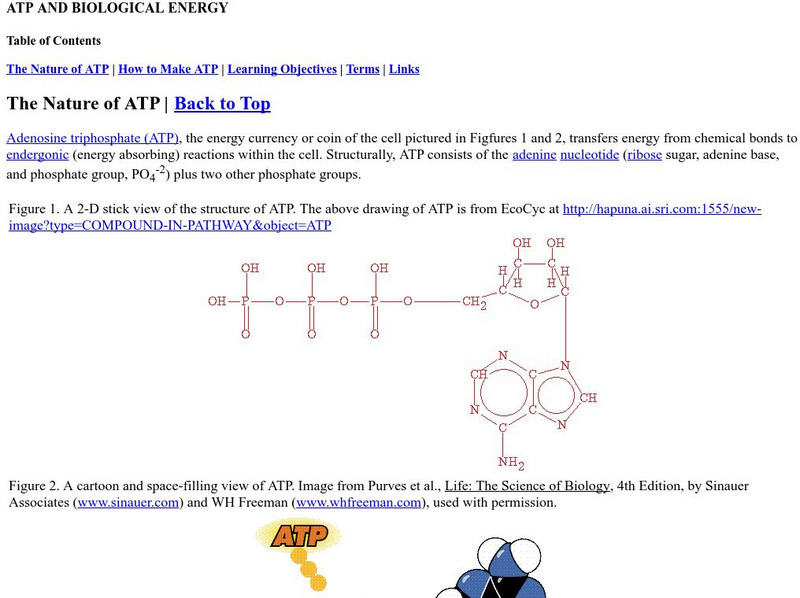Curated OER
Contraction in Action
Students are put in groups of 6 to 8, and they are given 20-30 minutes to write, design, direct, and block out (determine location and movement) a skit that illustrates the function of a sarcomere, and all the steps involved in its...
Curated OER
Biology Demos
Students participate in biology demos. In this biology lesson, students explain how energy is released in the ATP cycle. They demonstrate DNA replication process.
Curated OER
Matrix Reactions
In this matrix reactions worksheet, students fill in the blank about the process of glycolysis. Students also draw an organelle- mitochondrion and label the parts with the given names.
Curated OER
Photosynthetic Word Search
In this biology worksheet, students identify and locate various vocabulary terms related to photosynthetic process. There are 32 biology terms located in the word search.
Other
Bristol University: Molecule of the Month:atp
A great page for all around biochemistry and background information. Includes the molecular structure and most of the information relevant to its role in living cells.
Other
Bristol University: Molecule of the Month:atp (Chime)
A great page for all around biochemistry and background. This version of the Bristol University site requires the CHIME plug-in to view the 3-D molecule. It is worth the time to download CHIME if you visit a lot of biochemistry or...
Other
Bristol University:molecule of the Month:atp(chemsymph.)
Great page for the general background and biochemistry of the molecule. This version of the Bristol University site offers a Java Applet version of the molecule that offers 3-D manipulation of the molecule. The CHIME version is better,...
CK-12 Foundation
Ck 12: Biology: Nucleic Acids
[Free Registration/Login may be required to access all resource tools.] Covers the structure and function of nucleic acids.
Science Struck
Science Struck: Why Is Atp an Important Molecule in Metabolism
A very detailed discussion of ATP. Looks at its structure, how it works, the reactions that take place that use it or produce it, the phosphocreatine system, glycolysis, the lactic acid cycle, aerobic respiration, the citric acid cycle,...
Biology Pages
Kimball's Biology Pages: Atp (Adenosine Triphosphate)
A good biochemistry site that includes information about the structure of adenosine triphosphate and a description of the role that it plays in the cell.
Georgia State University
Georgia State University: Hyper Physics: Energy Cycle From Plants to Animals
Find out about the essential role energy plays in cell function and in sustaining life. Trace energy transformations as they pass from one living thing to another.
Wikimedia
Wikipedia: Adenosine Triphosphate
Wikipedia provides information on adenosine triphosphate (ATP) including chemical properties, biological function, production, other triphosphates, and more.
Estrella Mountain Community College
Online Biology Book: Atp and Biological Energy
Through full-color images and concise information, learn about adenosine triphosphate, or ATP, the molecular unit of energy currency of cells.
BiologyWise
Biology Wise: Products of Glycolysis
Explains what happens during glycolysis in eukaryotic cells, what the products are, their composition, and their properties.
BiologyWise
Biology Wise: Guide to Aerobic Cellular Respiration and Its Stages
Describes the stages of aerobic cellular respiration and the chemical reactions taking place in each.
BiologyWise
Biology Wise: Active Transport Process
Explains what happens during the active transport process where substances are moved across a cell membrane.
BiologyWise
Biology Wise: Aerobic and Anaerobic Respiration and Their Differences
The steps and the chemical equations in aerobic and anaerobic cellular respiration are described as well as the differences between them.
BiologyWise
Biology Wise: What Is Anaerobic Respiration?
Explains what anaerobic cellular respiration is and how it differs from aerobic respiration. Discusses what this looks like in muscle cells, what the steps are, and the formula for anaerobic respiration.















